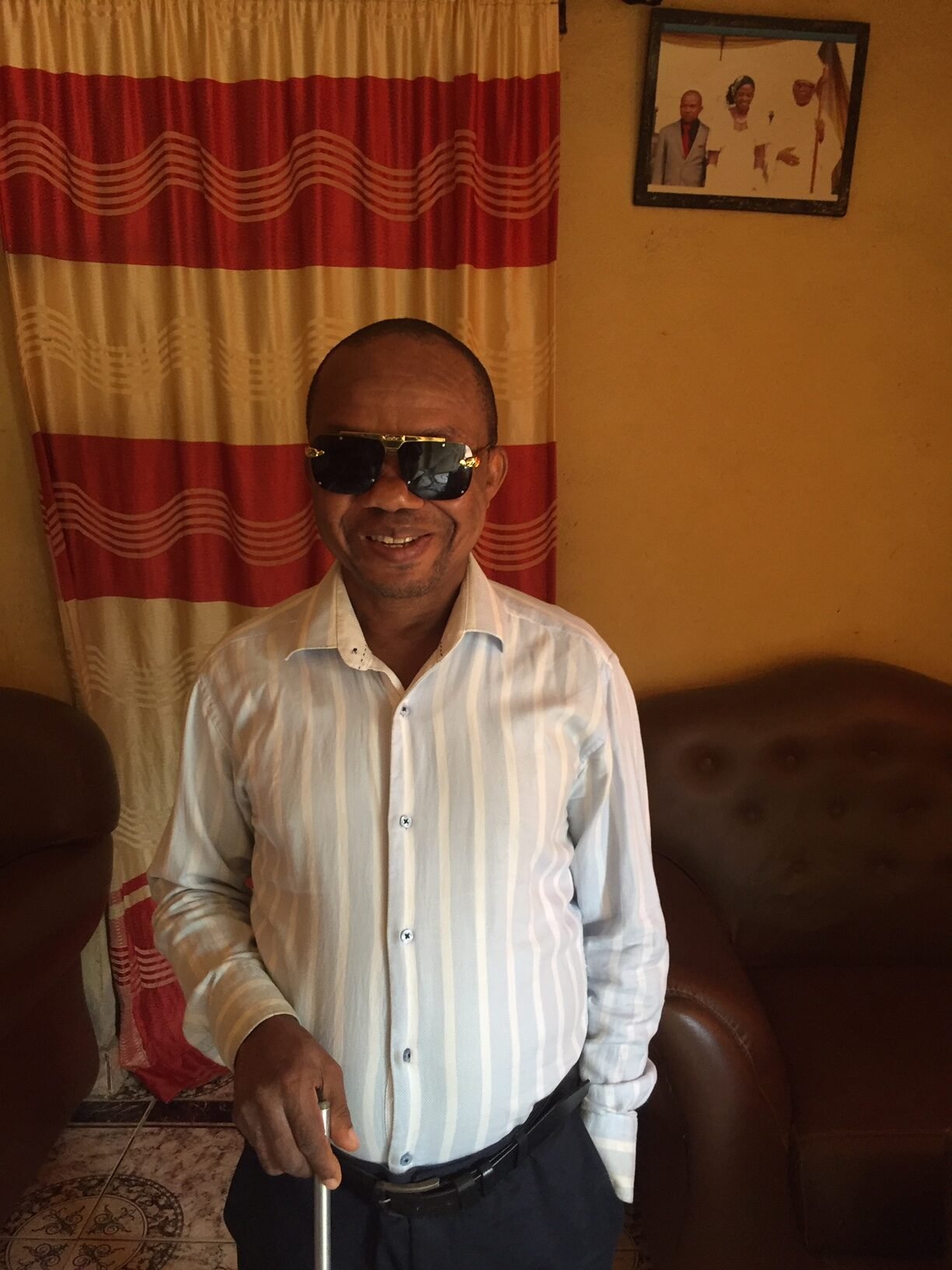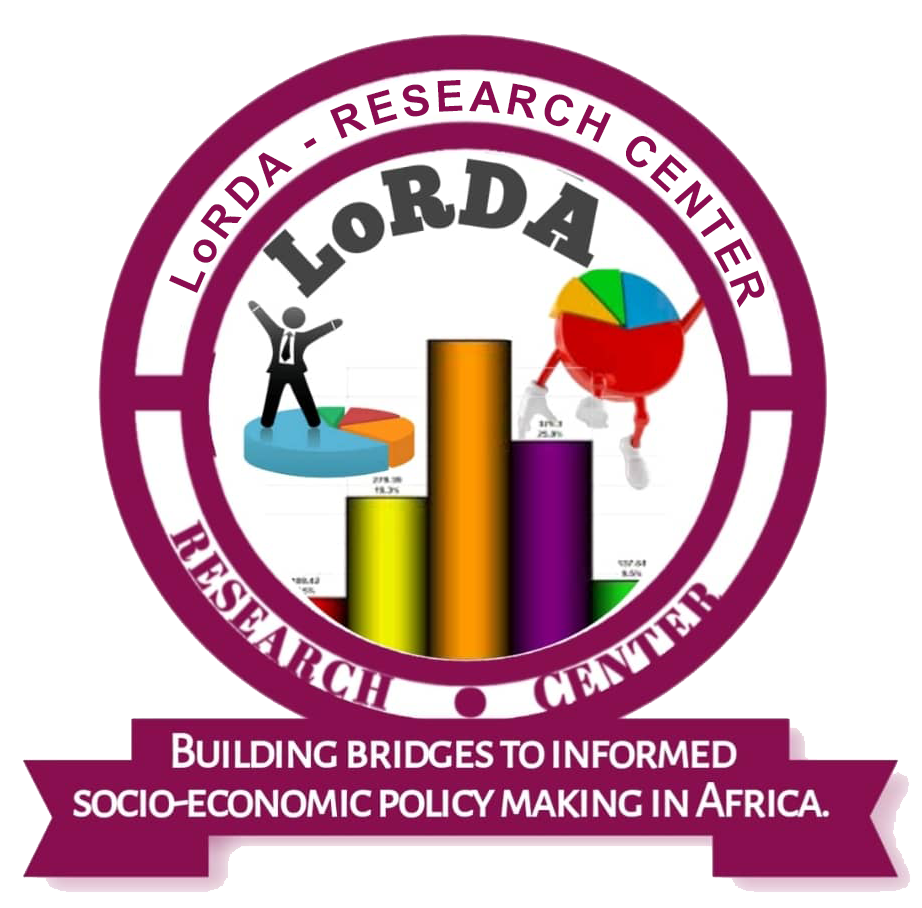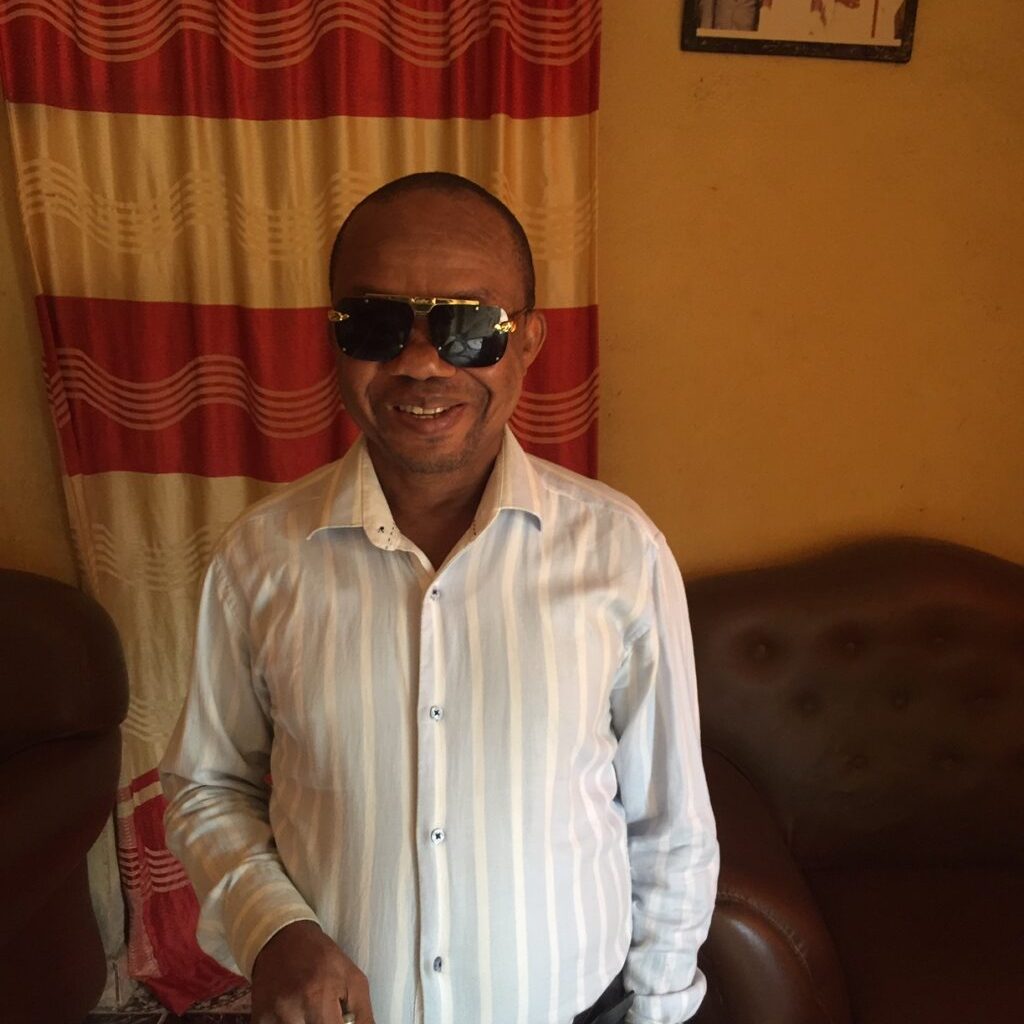 Kenneth in dark glasses, holding a white cane on his right hand, and left hand in his trouser pocket.
Kenneth in dark glasses, holding a white cane on his right hand, and left hand in his trouser pocket.
By Kesah Princely and Njukang Princeley
Before 2024, Kenneth Ulo had only faced one major storm in his life. However, the visually impaired Nigerian high school teacher says the year, expected to bring hope, has instead taken him several steps backward.
A new wave of inflation in Africa has dealt a major blow to people with disabilities on the continent. Each night, Kenneth goes to bed unsure of whether there will be food for the next day.
“I had to let go of my driver because I can barely afford to feed my family, let alone pay for fuel, car maintenance, and the driver’s salary,” he revealed in an interview with DNA.
A year predicted by many to be one of economic opportunities, especially for young Africans, has instead brought a storm of high inflation and currency devaluations to most countries. People with disabilities have been among the hardest hit by this economic crisis, with some breadwinners now forced to beg.
Nigeria is one of the countries badly affected by the surging economic crisis. Thousands of people with disabilities in the West African nation are suffering due to rising inflation and a weakening Naira.

Kenneth Ulo, who hails from Amuzu, a community in AbohMbaise Local Government Area of Imo State, says words cannot describe the situation of disabled people amidst the deepening crisis.
“In all my 49 years in this country, I’ve never experienced this kind of inflation,” Kenneth lamented.
Since the beginning of the year, Nigeria’s cost of living has skyrocketed. Government statistics revealed an inflation rate of nearly 30% as of January, the highest in about 30 years. The situation is further exacerbated by a 230% depreciation of the Naira. Leaders of the West African economic and military powerhouse have been scrambling for solutions, with street protests erupting across the country. VOA reports the high cost of living is driven primarily by a sharp rise in food and beverage prices.
At the peak of COVID in the second half of 2020, Nigeria’s economy contracted by 6.1%, and unemployment rose to 33%, up from 27% by the end of that year. Within the same period that the global economy witnessed a historic low. While states now seem to be recovering, Nigeria seems moving in the opposite direction.
Dr. Dickson Thomas Ndamsa, senior lecturer of economics, The University of Bamenda in Cameroon says many factors are responsible for the current down slope of Nigeria’s economy. “Inflation is a cankerworm that can destroy a nation,” he said in a recent interview. “It’s the most complex economic problem to solve.”
He identifies rising energy prices, poor tax policies, and weak infrastructure as some of the key factors shrinking the country’s economy, mirroring trends elsewhere on the continent. To the expert, the Naira’s further depreciation against the dollar only intensifies the inflation crisis.
With a population of nearly 210 million, the rising cost of living has become a national headache, with over 111 million people classified as poor, by the World Bank. The situation for disabled citizens is particularly concerning, with many now relying on alms for survival. “The situation is critical,” Dr. Dickson warned, urging an urgent multi-stakeholder response, led by Nigeria’s government and based on the country’s economic realities.
Headache of Inflation for Nigerians with Disabilities
Kenneth Ulo was 11 when cataracts stole his sight in 1986, while in junior secondary school. Efforts to recover proved futile, leaving him in complete darkness. “I was the only blind youth in my community,” he revealed, his voice thick with emotion. “It was a terrible pain for me and my parents.”
“I had only seen one blind person before, an old man. This was a huge storm in my life,” Kenneth continued.
Before 2024, Kenneth, who defied the odds to return to school as a visually impaired student, considered sudden blindness and a five-year education hiatus his greatest life challenge. However, the year brought a new entry to his CV of hardships
“People with eyes, legs, and ears are crying, some protesting on the streets,” he said sorrowfully. “That should tell you we, disabled persons, are in hell on earth. Inflation in Nigeria is pushing us towards death.”
Using the transportation sector as an example, Kenneth illustrated the devastating impact on Nigeria’s 25 million disabled people. “Any hope of independence is gone,” he lamented. “Before, finding someone to guide a blind person like me was possible. Now, with everyone struggling to afford food, booking a car is a luxury. Drivers are impatient; time is money, and everyone’s looking for their daily bread.”
The cost of living for people with disabilities in Nigeria remains a major concern, and Kenneth’s situation is just one among millions. Access to food, shelter, healthcare, education, and transportation is severely affected. Many who were previously breadwinners now depend on charity. For the unemployed, the situation is even more precarious.
Following a 2018 census, Nigeria’s disabled population was estimated at 19 million. This figure now stands around 25 million, with a majority in rural areas living on less than $1 a day.
Kenneth’s experience of attitudinal and physical barriers as a blind student fueled his commitment to support disabled children and youth. Since becoming financially independent in 2008, this commitment has translated into his work as a high school teacher. However, sustaining his own family and helping others has become increasingly difficult under the current economic climate. “The cost of living is unbearable, while salaries remain stagnant,” he cried.
Kenneth Ulo leads the Progressive African Blind Network, an organization for blind and partially sighted people across the continent. He revealed to DNA that his members, even outside Nigeria, are equally affected by the crisis.
A recent African Development Bank report highlights rising inflation across Africa, with Nigeria, Angola, Ethiopia, and Kenya among the worst hit. The report warns that unless controlled, these countries could face major crises, further jeopardizing disabled populations.
IN Ghana, where inflationary rates are reported to have slightly dropped from 23.5% in January 2024to 23.2% in February, women with disabilities say they feel devalued. This is because they can no longer cater for their basic needs due to a sharp rise in the prices of basic commodities.
Suraya Alidu, born 35 years ago in Kumasi, says surviving as a disabled woman in Ghana today feels like a stroke of luck. Diagnosed with polio at two, she lost her left leg to the disease. But giving up on her dream of becoming a journalist and using her voice to champion disability inclusion was never an option. She fought hard to achieve her goal, only to be thwarted by rising inflation just as she neared the peak of her aspirations. “You may have no idea how getting sanitary pads in Ghana is now a huge headache for us. Heavy bleeders who cannot depend on a single pack a month understand our pain,” she confided.

Suraya explains that the rising costs of transportation and food in the country is causing enormous hardships for persons with disabilities. “No matter how we struggle to manage our meager salaries, we can’t meet up with the soaring prices,” she said. “Just living as a person with a disability in this country alone is too expensive, and this situation has only worsened our headache.”
Suraya, a first-class graduate with a degree in Communications, says her biggest dream is to further her education. However, this dream remains just that – a dream – largely due to inflation and a weakened currency. While hoping to find a Messiah to help her achieve this dream, Suraya invests her time in building bridges for inclusive communities through her YouTube channel, a project she promotes with unwavering passion.
According to the latest Ghana Statistical Service population and housing census, there are approximately 30.8 million people in the West African nation, with 8% being persons with disabilities.
Most of these persons with disabilities live under precarious conditions, with almost no one coming to their rescue. Even the government, on which most of them put their hopes, is failing them. In 2022, hundreds of toll booth workers with disabilities went on protest after the Ministry of Roads and Housing laid them off following the introduction of an electronic tax system. These workers say surviving this inflationary period is purely by the grace of God. Despite promises of redeployment, nothing has materialized, and there seems to be a lack of concern.
A Path Forward for Africans with Disabilities
Africa is home to over 80 million people with disabilities, according to the United Nations. This vast population is crucial for the continent’s growth. Dr. Dickson Tomas Ndamsa, the senior lecturer of economics, emphasizes that while efforts to contain inflation and safeguard African economies are critical, disabled people must be integrated into the recovery plan. “Their voices must be considered,” he advocated. “No system can effectively respond to their needs without involving and listening to them.”

Dr. Ndamsa, who also heads the LoRDA Research Centre in Bamenda, Northwest Cameroon, understands firsthand the devastating impact of crises on disabled people. He operates in a region ravaged by armed conflict, where persons with disabilities are among the most vulnerable.
“Our center builds bridges to inform policies in Africa,” he explains. “We teach people with disabilities the importance of independent thinking and how to participate in decision-making, especially regarding policies that impact their well-being.”
He recommends immediate measures to mitigate the lethal effects of inflation on people with disabilities, including social transfers involving cash distribution, scholarships for disabled students in both formal and informal education, and special food support services. Dr. Ndamsa also advocates for special recruitment quotas for disabled people. This, he believes, would deter street begging and promote a culture of hard work within the African disability community.
While acknowledging the importance of these measures in preventing a looming humanitarian crisis for Africa’s over 80 million disabled population, Dr. Ndamsa has stressed the need for a lasting solution to soaring inflation. Currency stabilization, improved infrastructure development, subsidies for basic domestic products, and favorable tax systems are among the key areas that governments must prioritize if they are serious about economic growth. Continuing on the current path will only inflict further damage on already struggling African economies.
For Kenneth and Suraya, an improved standard of living, equitable employment opportunities, increased salaries, informed policies driven by sound data collection, and respect for their dignity would reignite hope in their humanity. They are weary of discrimination and exclusion. Any further delays in assisting them in this fight against inflation amount to their obliteration.

